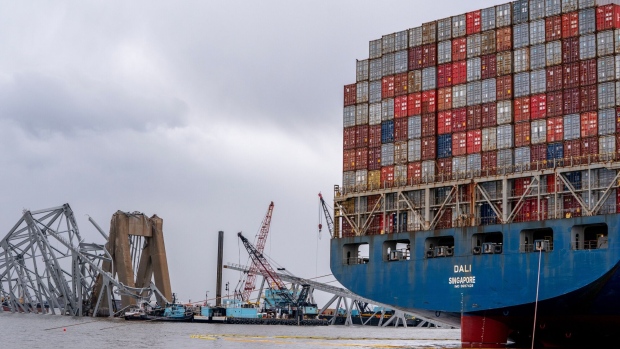Apr 17, 2024
Firms in Beige Book Fret Over Any Lengthy Baltimore Port Closure
, Bloomberg News

(Bloomberg) -- The closure of one of the East Coast’s busiest ports after the collapse of Baltimore’s Francis Scott Key Bridge has so far not led to broad price increases, though firms are concerned about any extended shutdown, according to a Federal Reserve report.
“Businesses we talked to said they can manage a short-term disruption but if the effort to reopen the channel takes longer, they then expressed greater concerns about lead times and increased costs,” the Richmond Fed, which includes Baltimore, reported in the central bank’s most recent Beige Book.
Since the March 26 destruction of the Key Bridge that spanned Baltimore Harbor, a vital port for ships carrying a wide range of goods and materials, efforts have been underway to clear thousands of tons of debris and reopen the shipping channel.
The US Army Corps of Engineers expects to open limited access to the Port of Baltimore by the end of April, and full access by the end of May.
Read more: Baltimore Port May Reopen by End of May on ‘Ambitious’ Timeline
The Fed’s Beige Book indicated that “disruptions in the Red Sea and the collapse of Baltimore’s Key Bridge caused some shipping delays but so far did not lead to widespread price increases.”
The impact on shipping, however, was mentioned by firms in other Fed districts around the country, such as New York, Chicago and St. Louis. In those areas there were anecdotal reports of some price impact.
Read more: Fed Beige Book Sees Slight Growth, Moderating Wage Pressure
“While ground freight rates moved down, one contact said ocean freight charges were up some after the collapse of the Francis Scott Key Bridge in Baltimore,” the Chicago Fed noted in the Beige Book.
©2024 Bloomberg L.P.

